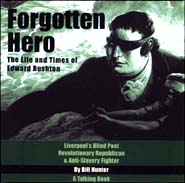A Hero No Longer Forgotten
EDWARD RUSHTON (1756-1814)
IT is just a few years since I heard about Edward Rushton, Liverpool's blind poet, anti-slavery campaigner and radical revolutionary.
Born in John Street, Liverpool, in 1756, Edward Rushton was educated at Liverpool Free School to the age of 11, and then he was apprenticed to a shipping firm, sailing to the West Indies. It was thus that he saw the slave trade first-hand and also befriended a young African slave of his own age.
Rushton's adventures at sea were ended when a disease caught overseas caused him to go blind at the age of 19. But that was just the start of a new life, in which he did not forget what he had seen, nor fail to advance those who faced the same obstacles as himself. Rushton wrote poetry, campaigned against the press gangs and against black slavery, and supported the American War of Independence and the French Revolution.
He founded the worlds first school for the blind which, in the middle of the nineteenth century, moved to a building later occupied by the Merseyside Trade Union, Community and Unemployed Resource Centre.
I think it was while in Liverpool during the 1995-8 docks struggle that Bill Hunter told me he was writing something about Edward Rushton, a figure I'd never heard of before. Bill, whom I'd known since my youth, had been at times an engineering worker, shop steward and professional revolutionary, and was known and respected by the dockers. He was also a great strengthener to those younger Trotskyists who sent Gerry Healy packing. In retirement, though not always in good health, Bill not only kept up his activities but broadened them, maintaining links with Latin American revolutionaries, and producng books on, among other things, his own life, the dockers' struggles and Edward Rushton. Bill Hunter says: “I wrote this book on Edward Rushton in an attempt to rescue from obscurity, this uncompromising fighter for the common people, and to pay tribute to his indomitable spirit.”
http://www.billhunterweb.org.uk/books/forgottenhero.htm
Living History Library
Book ISBN: 0-9542077-0-X
Talking Book ISBN: 0-9542077-1-8
 click on this icon to hear Rushton's 'Ode to a Robin'
click on this icon to hear Rushton's 'Ode to a Robin'Rushton's letter to Washington about the president's 'owning' of slaves
Chapter 12 - The Liverpool Seamen’s Revolt of 1775
Nerve review of the book
Bill Hunter is not the only one to have been inspired to write about Rushton, as it happens, historian Mike Royden appears to have beaten him to it, and you can read his account of Rushton's life and achievment here:
http://www.roydenhistory.co.uk/mrlhp/local/rushton/rushton.htm
Actor John Graham Davis seems to have been typecast as a copper for much of his TV appearnces, though recently promoted to be a judge for Peter Barlow's trial on Coronation Street. Whether he'll get to judge the real culprit we'll have to wait and see, but meantime John, whom I met in Leeds through Workers Aid for Bosnia, takes on a different kind of role this month. It's appropriate as he was the speaking voice in the Talking Book version of Forgotten Hero. Here's a message from John on Facebook:
This month marks the bi-centenary of Liverpool's great unsung radical, Edward Rushton. I've spent two years researching and writing about this extraordinary man, and I can't believe that he has remained a virtual secret for two hundred years. Come and help us in this archeological dig, and celebrate our forgotten hero... Blinded at seventeen as a result of helping kidnapped Africans below decks on a slave ship, Rushton educated himself by having a boy read to him during a long period of poverty. Eventually accepted into the liberal abolition circles dominated by university men such as Rathbone and Roscoe, the 'ordinary sailor' Rushton became one of the most intransigent opponents of slavery, suffered hostility within the slave trading city, lost two businesses through Admiralty boycotts and widespread public hostility and escaped an assassination attempt - only to persevere in his various campaigns, and to finally see the slave trade abolished in 1805.
To celebrate Rushton's life - and hopefully to help pull him out of his shameful anonymity - Turf Love and DaDaFest are collaborating on a number of events in Liverpool throughout November and the coming months. Here's what's lined up.... Exhibitions at the Victoria Museum and the National Slavery Museum, readings in libraries sponsored by UNISON, a commemorative inter-faith service in the Anglican Cathedral (Nov 22nd) and a staged reading of the new play by James Quinn and myself, Unsung. Please book free tickets below.
All these things are in celebration of a remarkable man: radical reformer, determined slavery abolitionist, fighter against impressment (the press gang), defender of freedom of speech, campaigner, through his verse, against violence against women, supporter of the rights of the Irish against English colonial oppression, supporter of trade unions, of Polish independence from Czarism, of American independence from colonial rule, and of French freedom from autocracy. Rushton's poetry is also justly celebrated, and a new edition, featuring his passionate anti-slavery verse, is about to be published. Join us to celebrate this remarkable and shamefully neglected figure. Event details - http://www.dadafest.co.uk/the-festival/unsung/
I will be speaking about Edward Rushton and giving readings from his work on Wednesday Nov 12 at Toxteth Library (1.30-3) and Central Library (6.30-8pm). These readings are sponsored by UNISON, and are free. It would be really good to see you at some of these events.
John Graham Davies
Labels: artists and poets, Books and Writers, Disabled, Left, Merseyside


0 Comments:
Post a Comment
<< Home